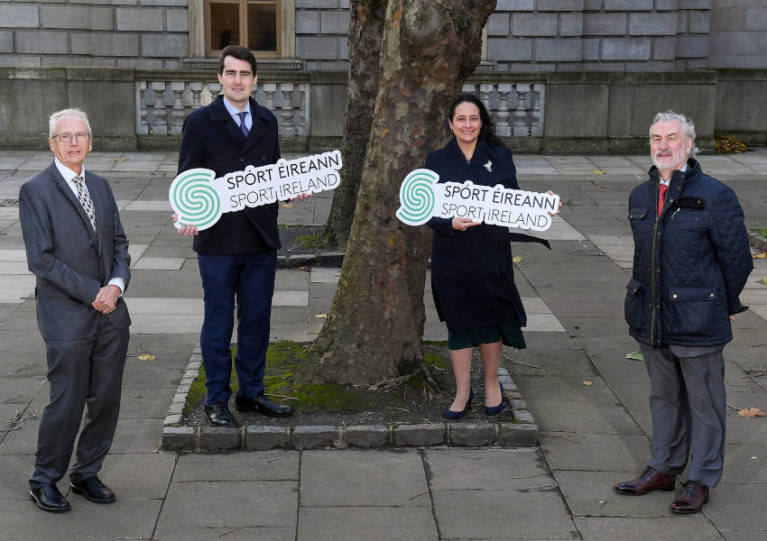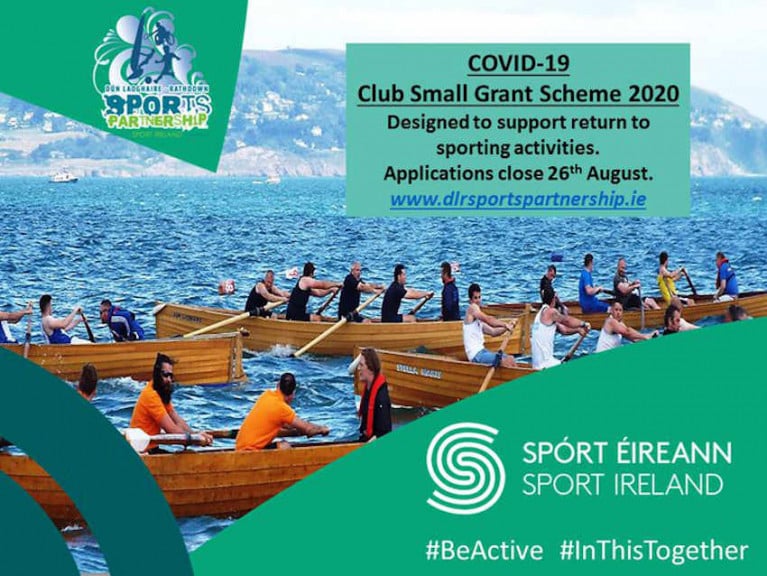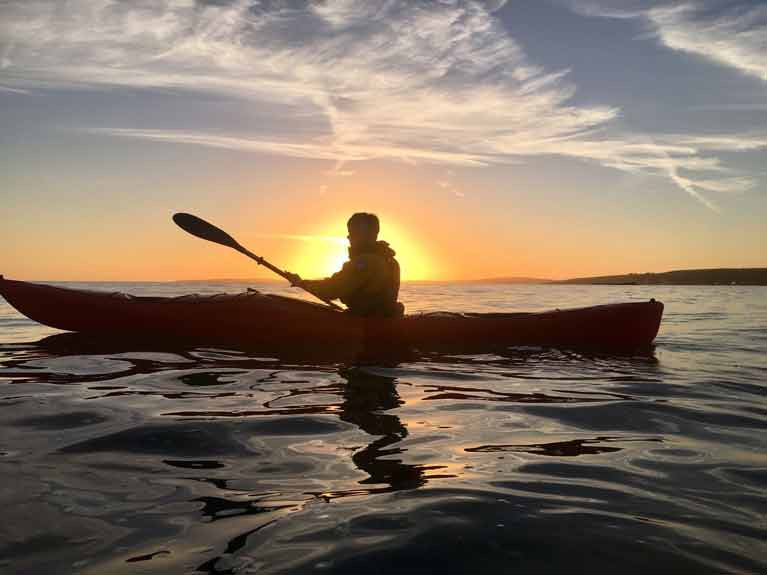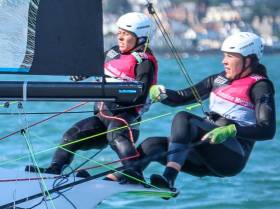Displaying items by tag: Sport Ireland
Sailing Boosted By €745k Funding for Post-Pandemic Recovery & Growth
Sailing benefits from a total of €745,000 in grants following a major funding boost for sports to recover and grow post-pandemic.
Minister for Sport Catherine Martin and Minister of State for Sport Jack Chambers joined Sport Ireland today (Monday 13 December) to announce the almost €80m windfall for the sport sector under two separate support programmes.
These aim to support recovery and growth of sports organisations and club networks, and provide for new sports equipment including state-of-the-art equipment for high performance athletes.
Minister Martin said: “It’s important that the sport sector is on a firm financial footing. The additional funding, coupled with the increase in the budget for sport in 2022, will ensure the long-term viability of our sports organisations, high performance sport and will make sure sport remains accessible to all.”
Under the €73.6m COVID funding scheme, Irish Sailing receives €350,000 from the Club Resilience Fund to support Ireland’s sailing clubs — many of which also received a boost from Sports Capital Funding in August.
This funding is in addition to the COVID-19 contingency fund directed towards exceptional costs generated by the Olympic and Paralympic Games in Tokyo, which were postponed for 12 months until this year.
Meanwhile, under the €5.3m equipment grants scheme, Irish Sailing receives €102,000 for general participation and €293,000 for high performance activities — totalling €395,000.
Other watersport bodies to benefit include Rowing Ireland, which receives €185,000 (€85,000 from the NGB Resilience Fund; €100,000 from the Club Resilience Fund) plus a further €385,000 for equipment (€60,000 general participation, €325,000 high performance).
Caneoing Ireland gets €118,000 (€18,000 from the Club Resilience Fund and €100,000 from the Restart Fund to support the return of sport and physical activity) and a further €213,000 for equipment (€143,000 general, €70,000 high performance).
Diving’s governing body the Irish Underwater Council receives €10,000 from the NGB Resilience Fund and €110,000 under the Club Resilience Fund, plus €35,000 to fund equipment for general participation.
Irish Surfing gets €20,000 from the Restart Fund and another €20,000 for general-use equipment, while the Angling Council of Ireland gets €10,000 from the Restart Fund and €60,000 from the equipment grants scheme for general participation.
Sport Ireland and key stakeholders have come together to encourage everyone to be alert to water safety this summer.
The initiative comes at a crucial time, with the August Bank Holiday approaching and the shocking news of more than seven water tragedies within a week around the island of Ireland.
“By pooling resources and collaborating on this campaign, we all hope to spread the message on water safety, and encourage people to be safe on the water and save lives,” Sport Ireland says.
“We are privileged to live on an island with an abundance of water to enjoy and we are spoilt with the choice of activities or enjoyment that people of all ages and abilities can derive from the water.
“The outdoors has acted as an escape for many during the last year and there has been a significant increase in the number of people taking to the water and enjoying water based activities.
“It is however critical that everyone respects the dangers that exist around water and that that people know how to be safe around, on and in the water.”
Everyone is encouraged to familiarise themselves with and follow these key water safety messages:
- Check weather, water conditions and tides before going on or in the water.
- Let someone know where you are going and what time you expect to be back.
- Do not go alone, even if whoever you bring doesn't get on or in the water.
- Have a method of calling for help. In an emergency call 999 or 112 (or use VHF Channel 16) and ask for the coastguard.
- Use an appropriate lifejacket or buoyancy aid if you are doing activities on the water.
- Ensure you are visible in the water and do not go in or on the water during reduced light.
- Do not use inflatable toys in open water.
“It is important that parents and guardians educate children on these key water safety messages and that people are aware of the many hazards of swimming in undesignated areas,” Sport Ireland adds.
This statement is endorsed by:
- Department of Tourism, Culture, Arts, Gaeltacht, Sport and Media
- Department of Defence - Office of Emergency Planning
- Department of Rural and Community Development
- Local Government Management Association and the local authorities
- Water Safety Ireland
- RNLI
- Irish Coast Guard
- Fáilte Ireland
- Coillte
- Leave No Trace Ireland
- Waterways Ireland
- Dublin Mountains Partnership
- Swim Ireland
- Canoeing Ireland
- Irish Surfing
- Irish Sailing
- Irish Underwater Council
- Fingal Sports Partnership
- Tipperary Sports Partnership
- Carlow Sports Partnership
- Cavan Sports Partnership
- Donegal Sports Partnership
- Galway Sports Partnership
- Waterford Sports Partnership
- Meath Sports Partnership
- Kerry Sports Partnership
- Louth Sports Partnership
- Kilkenny Sports Partnership
- Limerick Sports Partnership
The Government's phased easing of some Covid-19 restrictions during the month of April was welcome news but there was also some disappointment expressed in boating circles over a lack of clarity contained in the announcement that makes it difficult to plan the season, especially the staging of major summer regattas.
The Government aims to continue its cautious approach, gradually easing restrictions, while a substantial level of the population is vaccinated during April, May and June, after which, it should be safe to reopen society more widely.
In his address, the Taoiseach used the phrase ‘distance sports' to describe a sporting activity that was permitted but what does this mean for sailing, a low risk, outdoor, no-contact sport?
In a response to a query from Afloat, a Sport Ireland spokesman said 'At present, these are activities that can take place on a socially distanced basis and take place between a maximum of two households'.
 SB20 Sportsboat one-design racing on Dublin Bay pre-COVID Photo: Afloat
SB20 Sportsboat one-design racing on Dublin Bay pre-COVID Photo: Afloat
Single-handers
An interpretation of this means that single-handers, double handers and crews from two households can go sailing if they can 'distance' themselves.
But 'distance' does not extend to competition at this point, it refers only to private social sailing and it would exclude yachts with large crews from different households. So, Like golf or tennis, two parties can have a social game. Likewise, two individuals can have a recreational sail.
The spokesman said Sport Ireland has been in touch with the various National Governing Bodies, including Irish Sailing, on this matter.
Overall then, what we know is:
From 12th April
- travel within your own county or within 20km of your home if crossing county boundaries
From 26th April:
- Outdoor sports facilities can reopen and sailing clubs may remain open.
- ‘Distance’ Sailing activities may take place between a maximum of two households
- School-aged children may resume training using the pod system (pods of 15)
- No matches or events may take place (other than exempted events)
By any interpretation, this does not appear to allow for cruiser-racer sailing, except for small crew numbers on board. Clearly, this could have a major impact on the most popular aspect of the sport, for early summer at least.
Even though we know that there is little difference between sailing in training and racing modes, the sport is reliant on the not so small matter of lockdown measures easing from Level Five to Level Two (when racing is permitted) but, as widely anticipated, this did not materialise in this week's announcement.
Still, on Dublin Bay, DBSC and ISORA, race organisers are both aiming for May starts in 'some form', subject to guidelines. In June, the Dun Laoghaire-Dingle Race and the Sovereign's Cup at Kinsale are due to get underway.
Reduced Crews?
It raises the question, that if this situation is to be considered the norm for the next two to three months, then sailing should be looking at reduced crews for racing in the future, as they are doing in the UK? Such a move was previously explored on Afloat here.
This weekend, for example, one design keelboats are sailing in the Solent for the first time this year and boats that normally allow five are only taking four crew. Likewise, cruisers crew numbers in the UK are limited.
The first race starts this weekend, the JOG Race, and below is one of the sailing instructions:
- 17.1 Crew numbers for this race are limited to a maximum of 6, irrespective of a family group or other considerations. This is a maximum and skippers may limit their own crew in line with social distancing and other requirements.
Coincidentally, the first RORC event also starts this weekend; long coastal day races over three weekends, with a maximum of 80% of normal crew numbers.
By reducing crew numbers it could help to comply with the 'distance sport' ruling and give sailing room to negotiate a return to competition because there is no way nine people sitting out on a 35-foot cruiser will meet these criteria.
Sailing & Aquatic Sports Share in ‘Unprecedented’ €85m Funding Package to Address Covid-19 Challenges
Sailing in Ireland is set to benefit from an “unprecedented” €85 million funding package for the sports sector.
Sport Ireland chairman Kieran Mulvey said the announcement — made today (Monday 2 November) by Sport Minister Catherine Martin and Minute of State for Sport Jack Chambers — represents “the largest ever investment package for sport”.
It follows a €70 million package approved over the summer as the Government aims to address some of the extended challenges of the coronavirus pandemic.
John Treacy, chief executive of Sport Ireland, said: “The initial schemes announced in June were designed to support organisations with Covid-19-related losses in 2020.
“However, having engaged with our funded bodies, we understand that the current Level 5 restrictions present additional challenges.
“As such, we are ring-fencing finances to address any immediate needs that may arise in the sector in the coming weeks.”
Among the allocations to national governing bodies, Irish Sailing will receive €650,000, while Rowing Ireland gets €149,000, €70,000 goes to the Irish Underwater Council, €50,000 to the Irish Surfing Association and €48,000 to Canoeing Ireland.
The Olympic Federation of Ireland has welcomed the funding “which will provide much needed support for a wide variety of Olympic sports, many of which have been severely impacted by Covid-19”.
It adds that the package will also “provide some stability to protect performance programmes for those elite athletes currently preparing for the Olympic and Paralympic Games in Tokyo next year”.
Dun Laoghaire’s waterfront yacht clubs are among the sports clubs that may be eligible to apply for Covid-19 Club Small Grants of up to €1,500 through the Dun Laoghaire Rathdown Sports Partnership.
The grants are part of a series of funding schemes from Sport Ireland following the announcement of €70 million of funding by the Government to support the sports sector in response to the coronavirus crisis.
Implemented by Sport Ireland’s network of Local Sports Partnerships, the grant scheme will provide assistance to local clubs with covering costs associated with the reopening of sports clubs.
Grants can be used to support Covid-19-related expenditure dating from 2 May, when the Roadmap to Recovery was published, onwards.
The scheme is needs-based, designed to support sports clubs that do not have the finances to implement the necessary hygiene and social distancing protocols.
As the total fund available is limited, clubs which already have the finances to implement Covid-19 protocols should not apply.
In addition, the scheme is designed and intended to support return to sporting activities only and cannot be used to support costs related to hospitality services.
There is a limit of one application and €1,500 per club on this grant scheme. Applications will be means tested and only clubs with the most need will be eligible for the full amount. Clubs should not feel that they have to apply for the full amount to be considered for support.
Sports clubs are advised to contact DLR Sports Partnership at [email protected] or 01 2719502 for further information on this scheme.
Funding applications must be submitted prior to Wednesday 26 August via the application form HERE.
Canoeing Among ‘Low-Risk’ Sports That Will Be First Priority When Relaxing Covid-19 Restrictions
Outdoor activities that allow for physical distancing will be the first priority when relaxing restrictions on organised sports, the chief executive of Sport Ireland has said.
Speaking at a press briefing with Taoiseach Leo Varadkar on Friday last (24 April), as The Irish Times reports, John Treacy suggested that sports such as golf, which are performed in the open air with significant distance between competitors, would be among the first for review.
Sports Minister Brendan Griffin also confirmed, according to The Times, that Sport Ireland has classified various sports depending on whether they are judged to be low, medium or high risk of spreading Covid-19.
Though there was no mention of single-handed sailing classes, canoeing was expressly cited along those classed as low-risk.
But Minister Griffin stressed that “planning is an an early stage and none of this has been cleared by the National Public Health Emergency Team”.
He added: “We want to be ready to go when we get the nod. It would be important for national morale if some sport could return.”
Annalise Murphy Back In Training With 49erFX — But Without Sport Ireland Direct Funding
The Irish Times reported earlier this month that Irish Olympic medallist Annalise Murphy no longer has her direct funding support from Sport Ireland.
Performance in competition is a prerequisite for the €40,000-per-annum support under the international carding scheme, also known as the ‘podium’ grand.
However, 29-year-old Annalise moved on from the Laser Radial class after her silver medal win in Rio in 2016.
She spent a number of months in 2017 and 2018 sailing in the Volvo Ocean Race before taking up the 49erFX with a view to qualifying for the Olympics in Tokyo next year.
Annalise recently resumed winter trials with her new boat in Portugal, joined by sailing partner Katie Tingle now recovered from an arm injury sustained last year.
Their first competition as a duo is expected be the Sailing World Cup series regatta in Genoa, Italy this April.
And both will continue to be supported by Irish Sailing, with high performance director James O’Callaghan saying: “The important thing is that [Annalise is] full on campaigning for Tokyo, and we’re delighted to have her back.”
The Irish Times has more on the story HERE.



























































